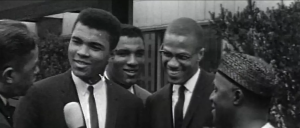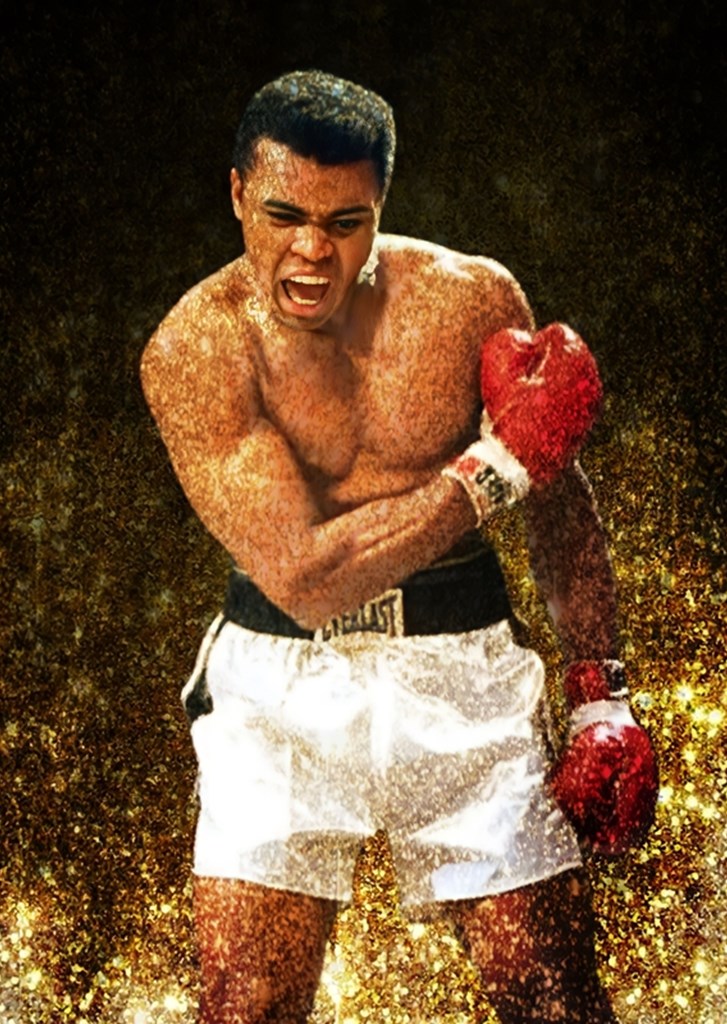
Ali and Malcolm X – image right, Netflix
The journey of Muhammad Ali began in Louisville, Kentucky, where he was born Cassius Marcellus Clay Jr. on January 17, 1942. Growing up in the segregated South exposed him firsthand to the racial inequalities prevalent in society at that time. Despite the obstacles, Ali’s childhood was defined by his abundant energy, charisma, and a natural talent for boxing.
Guided by trainer Joe Martin, Ali swiftly advanced in amateur boxing, displaying unmatched speed, agility, and skill in the ring. His exceptional journey reached its pinnacle with a gold medal at the 1960 Rome Olympics, foreshadowing the remarkable career that awaited him.
Ali’s professional career was truly legendary, characterized by his bold predictions, remarkable footwork, and unparalleled showmanship. From his renowned fights with Sonny Liston to his epic battles with Joe Frazier and George Foreman, Ali mesmerized the world with his extraordinary abilities and charm.
Beyond Boxing: Ali’s Activism
Apart from his accomplishments in boxing, Ali emerged as a vocal supporter of civil rights, religious freedom, and social justice. His steadfast opposition to racial discrimination and his refusal to serve in the Vietnam War gained him both admirers and critics. Despite facing significant backlash and legal consequences, Ali remained resolute in his beliefs, solidifying his reputation as a cultural icon and activist.
One of Ali’s most significant moments came during the iconic “Thrilla in Manila” fight against Joe Frazier in 1975. This grueling showdown, which tested both men’s endurance and determination, showcased Ali’s unwavering spirit and resolve, cementing his position as one of the greatest athletes in history.
Ali’s Everlasting Influence on Pop Culture
Ali’s impact extended beyond the realm of sports, influencing popular culture in profound ways. From his magnetic charisma to his memorable catchphrases like “Float like a butterfly, sting like a bee,” Ali captivated audiences worldwide, leaving an enduring mark on the 20th-century zeitgeist.
Although Ali passed away in 2016, his legacy continues to inspire individuals of diverse backgrounds and ages. His unwavering dedication to his beliefs, his resilience in the face of adversity, and his ability to instigate change stand as a timeless reminder of the strength of conviction and the importance of advocating for justice.
During the commemoration of Black History Month, it is impossible to ignore the profound impact of Muhammad Ali on the cultural landscape. His life and legacy stand as a testament to the enduring strength of perseverance, courage, and resilience in the face of injustice.
In summary, Muhammad Ali’s contributions to Black history are as deep as they are varied. From his unparalleled feats in the boxing ring to his unyielding support for social justice, Ali’s legacy serves as a beacon of hope and motivation for future generations.
Muhammad Ali’s unwavering commitment to his principles and his indomitable spirit make him a remarkable figure to honor during Black History Month. His legacy transcends sports, motivating numerous individuals to stand up for their beliefs and tirelessly advocate for justice and equality. To learn more about his life, visit the Ali center

